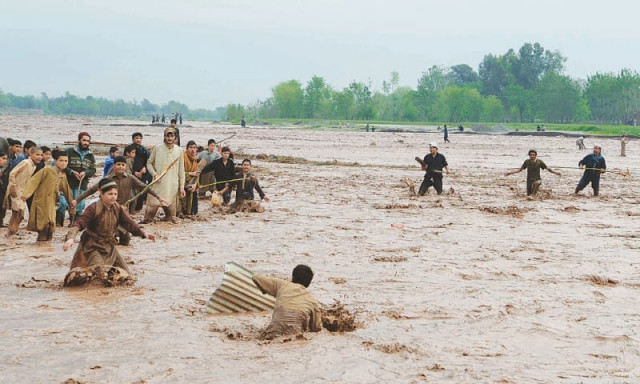Global warming caused by human activity hits record high: report
Pakistan continues to remain among the world's most climate change-vulnerable countries.

Planet Earth's temperature has risen by 1.3 degrees celsius during the past year, primarily due to human activities such as burning coal for cheap energy production.
A recent report by the University of Leeds, has said that human-induced warming has surged to 1.19°C during the past decade, up from 1.14°C during the same period preceding it.
Even though excessive greenhouse gas emissions from highly industrialised Global North states have significantly raised heat levels across the planet, countries like Pakistan, which have struggled to devise and implement a cohesive action plan in response to climate change, are now trapped in a furnace.
The industrial hub, Karachi, appears to bear the brunt of global warming since the gradual proliferation of heat-trapping concrete constructions and alarming paucity of tree plantations have raised the odds of a devastating heatwave hitting the port city, which is already simmering at temperatures as high as 40 degrees Celsius.
The report states that at approximately 200 gigatonnes, the remaining carbon budget represents merely five years' worth of current emissions. Such a trajectory raises urgent alarms as experts convene in Bonn to lay the groundwork for the upcoming COP29 climate conference slated for November in Baku, Azerbaijan.
In Pakistan, where the government has issued nationwide heatwave warnings, the International Rescue Committee (IRC) has also sounded the alarm. With 8.6 million people facing food insecurity amid scorching temperatures, the country is bracing for the adverse affects of the changing climate.
Spread over 12,605 hectares, the Margalla Hills in the outskirts of capital Islamabad experiences many fire incidents every summer. The hills were ablaze numerous times last month alone.
Heatwaves are predicted to exacerbate existing crises of drought and flooding, leading to widespread destruction of agricultural lands and skyrocketing food prices.
The IRC's findings show the multifaceted impact on education, household incomes, and a surge in extreme survival measures, including child labour and marriage.
Despite efforts to curb emissions, global temperatures continue to spiral upwards at an alarming rate. Natural climate variability, including the influence of El Niño, further compounds the challenge, amplifying temperature extremes.
The report also sheds light on the diminishing cooling effect of aerosol emissions, a consequence of ongoing reductions in sulfur emissions from the global shipping industry.
While past fluctuations, such as aerosol emissions from Canadian wildfires, temporarily offset warming trends, the long-term trajectory signals a concerning decline in cooling mechanisms.
Premier Shehbaz Sharif earlier on Wednesday called on citizens to unite with the global movement aimed at reclaiming land, enhancing drought resilience, and combating desertification.
Punjab Chief Minister Maryam Nawaz has also implemented a ban on the use of plastic bags across the province, effective today.



















COMMENTS
Comments are moderated and generally will be posted if they are on-topic and not abusive.
For more information, please see our Comments FAQ